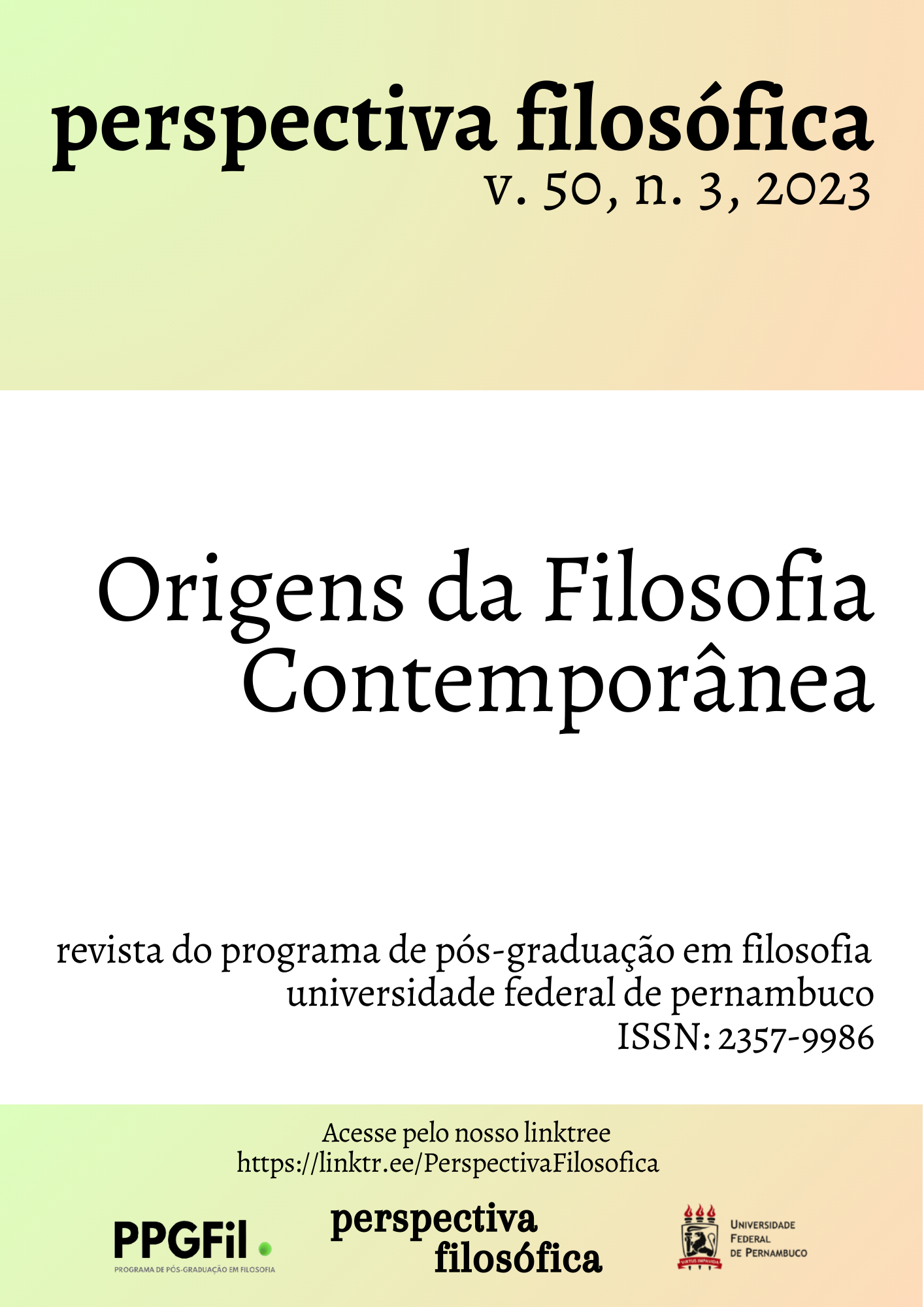Realismo conceitual e a leitura de Brandom da filosofia hegeliana
DOI:
https://doi.org/10.51359/2357-9986.2023.260720Palavras-chave:
Robert Brandom, G.W.F. Hegel, realismo conceitualResumo
Em A Spirit of Trust (2019), Robert Brandom endossa e atribui a Hegel um realismo conceitual segundo o qual a própria realidade é conceitualmente estruturada, independentemente de nossas práticas. Este realismo, baseado em relações de incompatibilidade modal material, fundamentaria, por sua vez, as condições transcendentais de possibilidade de normas conceituais com conteúdo determinado. O presente texto expõe os principais elementos da leitura de Brandom do realismo conceitual hegeliano e, a seguir, procura analisá-la por meio de considerações acerca do uso dos termos “realismo” e “idealismo” na filosofia hegeliana, da sua comparação a outras posições semelhantes na literatura sobre Hegel, tais como as de R. Stern e K. Westphal, e da apresentação de algumas críticas à leitura de Brandom, especialmente a de W. Wolf.
Referências
BOUCHÉ, Gilles (Ed.). Reading Brandom – On A Spirit of Trust. New York: Routlegde, 2020.
BOUTON, Christophe. „Idealismus und Realismus bei Hegel“. Hegel-Studien 52. Felix Meiner Verlag, 2019.
BOWMAN, Brady. Hegel and the Metaphysics of Absolute Negativity. Cambridge: Cambridge University Press, 2013.
BRANDOM, Robert. A Spirit of Trust – A Reading of Hegel’s Phenomenology. Cambridge, MA: The Belknap Press of Harvard University Press, 2019.
BRANDOM, Robert. Articulating reasons: an introduction do inferentialism. Cambridge, MA: Harvard University Press, 2000.
BRANDOM, Robert. “Hegel e filosofia analítica”. Veritas, Porto Alegre, v. 56, n. 1, jan./abr. 2011, p. 78-94.
BRANDOM, Robert. Making it Explicit: Reasoning, Representing, and Discursive Commitment. Cambridge, MA: Harvard University, 2001 [1998].
BRANDOM, Robert. “Some Hegelian Ideas of Note for Contemporary Analytic Philosophy”. Hegel Bulletin 35/1, 2014, pp. 1–15.
BRANDOM, Robert. “Some pragmatist themes in Hegel’s idealism”. European Journal of Philosophy 7: 2, 1999, pp. 164-189.
BRANDOM, Robert. Tales of the mighty dead: historical essays in the metaphysics of intentionality. Cambridge, MA: Harvard University Press, 2002.
HALBIG, Christoph. Objektives Denken: Erkenntnistheorie und Philosophy of Mind in Hegels System. Stuttgart: Bad Cannstatt, 2002.
HALBIG, C.; QUANTE, M.; SIEP, L. Hegels Erbe. Frankfurt am Main: Suhrkamp, 2004.
HEGEL, G. W. F. Werke in 20 banden. Auf der Grundlage der Werke von 1832-1845 neu hrsg. von Moldenhauer, Eva und Michel, Karl Markus. Frankfurt am Main: Suhrkamp, 1969.
ILLETTERATI, Luca. “Der einzige Inhalt der Philosophie – Ontologie und Epistemologie in Hegels Begriff der Wirklichkeit“. In: ILLETTERATI, Luca; MENEGONI, Francesca (Hrsg.) Wirklichkeit. Beiträge zu einem Schlüsselbegriff der Hegelschen Philosophie. Frankfurt am Main: Vittorio Klostermann, 2018.
KREINES, James. Reason in the World: Hegel’s Metaphysics and Its Philosophical Appeal. Oxford: Oxfor University Press, 2015.
PIPPIN, Robert. Hegel’s Idealism: The Satisfactions of Self-consciouness. Cambridge: Cambridge University Press, 1989.
REDDING, Paul. Analytic Philosophy and the Return of Hegelian Thought. New York: Cambridge University Press, 2007.
REDDING, Paul. “The Relation of Logic to Ontology in Hegel”. In: HAAPARANTA, L.; KOSKINEN, H. (Eds.) Categories of Being – Essays on Metaphysics and Logic. New York: Oxford University Press, 2012, pp. 145-166.
SELLARS, Wilfrid. Empiricism and the Philosophy of Mind. With an introduction by Richard Rorty and a study guide by Robert Brandom. Cambridge, MA; London: Harvard University Press, 1997 [1956].
STERN, Robert. Hegelian Metaphysics. New York: Oxford University Press, 2009.
WESTPHAL, Kenneth. Hegel’s Epistemology: a philosophical introduction to the Phenomenology of spirit. Indianapolis: Hackett Publishing Company, 2003.
WOLF, W. C. “Rethinking Hegel’s Conceptual Realism”. The Review of Metaphysics, vol. 72, no. 2 (286), dec. 2018, pp. 331-370.
Downloads
Publicado
Edição
Seção
Licença
Copyright (c) 2023 Patrícia Riffel de Almeida

Este trabalho está licenciado sob uma licença Creative Commons Attribution 4.0 International License. A Revista Perspectiva Filosófica orienta seus procedimentos de gestão de artigos conforme as diretrizes básicas formuladas pelo Conselho Nacional de Desenvolvimento Científico e Tecnológico (CNPq). http://www.cnpq.br/web/guest/diretrizes
Autores que publicam nesta revista concordam com os seguintes termos:
Os autores mantém os direitos autorais e concedem à revista o direito de primeira publicação, sendo o trabalho simultaneamente licenciado sob https://creativecommons.org/licenses/by/4.0/deed.pt_BR que permite o compartilhamento do trabalho com reconhecimento da autoria e publicação inicial nesta revista.
Os autores têm autorização para assumir contratos adicionais separadamente, para distribuição não-exclusiva da versão do trabalho publicada nesta revista, com reconhecimento de autoria e publicação inicial nesta revista (Consultar http://opcit.eprints.org/oacitation-biblio.html).

Esta revista está licenciada com uma Licença Creative Commons Atribuição 4.0 Internacional.













